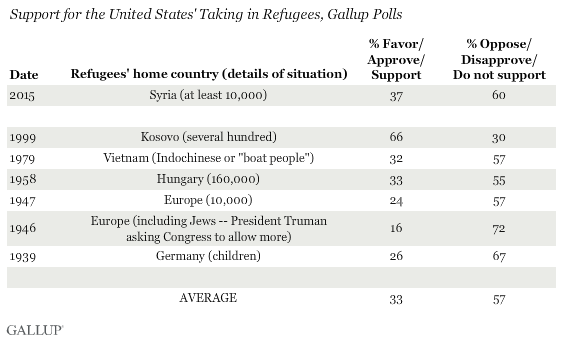American Attitudes Toward Refugees Over the Years

By:
The origins of American anxiety over refugees entering the country has historical precedent. Americans have consistently resisted outsiders, even when those groups were fleeing violence and political persecution. That includes Jewish refugees in the 1930s.
 Wikimedia/Ggia - wikimedia.org
Wikimedia/Ggia - wikimedia.org
Asked whether European political refugees should be admitted into the U.S. in a 1938 survey — in light of deepening concerns over Nazi Germany's aggressive expansion — only five percent of Americans said yes. In contrast, 68 percent of Americans said “[w]ith conditions as they are we should try to keep them out.” That's despite the fact that, around the time this survey was conducted, Jews were being forced into concentration camps, stripped of their civil rights, and had their businesses and assets seized in countries such as Germany and Austria.
The survey, which was published in the July 1938 issue of Fortune magazine, has resurfaced almost 80 years later; to some, it serves as a testament to America's long-standing paranoia around refugees. And the very sentiment expressed by 1938 Americans — that we should restrict refugees under the current circumstances — is being echoed in contemporary polling as well as by Republican presidential nominee Donald Trump, who proposed a ban on all Muslim immigration to the United States.
In Syria, violence from civil war and Islamic extremism has driven millions from their homes, creating a humanitarian crisis. Like Jews in 1938 Europe, many of these refugees are risking their lives to escape persecution — only to find themselves met with resistance in countries that promote democratic ideals. As polling shows, however, tragedy has not always inspired compassion from Americans, many of whom might sympathize with refugees but also express concern about their own safety.
In December, Trump called for “a total and complete shutdown of Muslims entering the United States until our country’s representatives can figure out what is going on.” While Americans are divided on the specific proposal (50 percent favor the ban and 46 percent oppose the ban), polls show that Americans remain generally opposed to taking in refugees today. According to a November 2015 Gallup poll, 60 percent opposed President Barack Obama's plan to take in 10,000 Syrian refugees, for example.
 Gallup - gallup.com
Gallup - gallup.com
Critics of the U.S. refugee policy are quick to cite national security concerns as the factor driving their opposition. It's not that they want to keep children and peaceful families out of the country — it's that letting people in could invite violent extremism, the logic goes. Trump's son, Donald Trump Jr., illustrated that argument with a heavily scrutinized meme on Monday that compared refugees to a bowl of Skittles.
"If I had a bowl of skittles and I told you just three would kill you. Would you take a handful?" the meme said. "That’s our Syrian refugee problem."
But the thing to keep in mind here is that concerns about national security is nothing new. The possibility that "Nazi spies and Communist infiltrators would sneak in with the wave of Jewish refugees arriving from Europe" also informed American opposition to refugees in the 1930s, The Rutland Herald reported. In other words, Americans, throughout history, have always worried about refugees.
